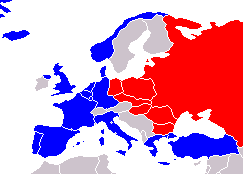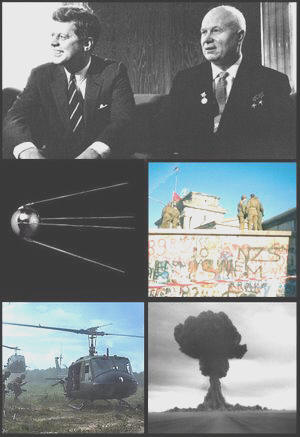 Le tenebre dell’Europa e
la gestione conflittuale del mondo globale: dai prodromi della Guerra Fredda a un
mondo policentrico
Le tenebre dell’Europa e
la gestione conflittuale del mondo globale: dai prodromi della Guerra Fredda a un
mondo policentricoIl corso, della durata di 40 ore, è dedicato all’approfondimento di un tema di grande rilevanza: il bipolarismo USA-URSS durante il periodo della Guerra Fredda.
Il corso sarà tenuto dai proff. Francesco Apergi e Paolo Genesio e sarà svolto in orario
 pomeridiano
con obbligo di frequenza.
pomeridiano
con obbligo di frequenza. Fu definita Guerra Fredda la situazione di conflitto non bellico che venne a crearsi tra due blocchi internazionali, generalmente categorizzati come Ovest (gli Stati Uniti e i suoi alleati della NATO) ed Est (l'Unione Sovietica e i suoi alleati del Patto di Varsavia) tra la fine della Seconda guerra mondiale e l'ultimo decennio del Novecento (circa 1945-1990).Tale tensione non si concretizzò mai in un conflitto militare vero e proprio, tale da comportare una contrapposizione bellica su vasta scala tra Est e Ovest: la presenza di armi nucleari nei rispettivi arsenali avrebbe reso irreparabile per il Pianeta un'eventuale aggressione e la relativa reazione. Durante tutta la Guerra Fredda gli arsenali nucleari delle due superpotenze vennero costantemente aggiornati e ingranditi fino all'ultimo periodo (1979-1989) nel quale vennero negoziati una serie di accordi (denominati accordi START) che portarono a sostanziali riduzioni degli arsenali nucleari. Ma durante tutta la Guerra Fredda fu costante la contrapposizione tra una corsa al riarmo apparentemente irrefrenabile e continui tentativi di controllo degli armamenti negoziati tra USA ed URSS o nell'ambito dell'ONU. Per definire l'esteso conflitto di posizioni, interessi contrapposti, propaganda e azioni di disturbo
 che
si era venuto a creare, dato che comunque tale situazione non comportava
l'impiego aggressivo degli eserciti regolari, fu coniata la metafora di guerra
"fredda". Furono necessarie molte attenzioni e una buona dose di diplomazia
per sedare sul nascere alcuni conflitti armati, al fine di prevenire una più
ampia guerra "calda" che avrebbe rischiato di estendersi e intensificarsi.
che
si era venuto a creare, dato che comunque tale situazione non comportava
l'impiego aggressivo degli eserciti regolari, fu coniata la metafora di guerra
"fredda". Furono necessarie molte attenzioni e una buona dose di diplomazia
per sedare sul nascere alcuni conflitti armati, al fine di prevenire una più
ampia guerra "calda" che avrebbe rischiato di estendersi e intensificarsi.
Students are given the opportunity to analyse an important period of recent
history. There has always been great difficulty in covering the most recent
events of European history within the syllabus so a group of teachers thought
students might be interested in doing an extra course in recent history. The
course has been higly appreciated especially by the students of the last year
of high school.
 The
Cold War was the protracted geopolitical, ideological, and economic struggle
that emerged after World War II between the global superpowers of the Soviet
Union and the United States, supported by their respective and emerging alliance
partners. It took place from about 1947 to about 1991.
The
Cold War was the protracted geopolitical, ideological, and economic struggle
that emerged after World War II between the global superpowers of the Soviet
Union and the United States, supported by their respective and emerging alliance
partners. It took place from about 1947 to about 1991.